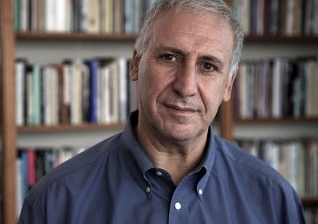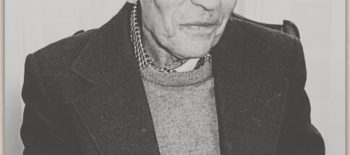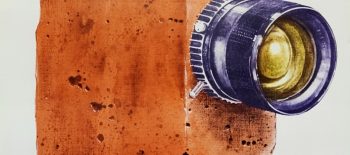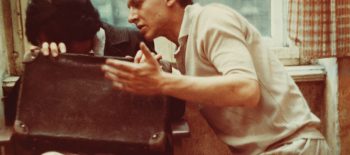Polish Poetry Unites is a new video series for anyone interested in literature, history and reading. In each episode Edward Hirsch, a distinguished American poet, and the president of the Guggenheim Memorial Foundation, will introduce a celebrated Polish poet to American audiences.
Edward Hirsch introduces American audiences to Cyprian Kamil Norwid with these words: „Norwid is an extremely interesting Polish poet. It’s really a shame that no one really knows him in our country. He’s one of the most important 19th Century Polish poets.“
Hirsch later adds a personal remark: “I like to think of him because my office is in midtown and he worked just a couple of blocks away at Bryant Park, as a graphic artist,“ he says, referring to Norwid’s work as a graphic artist on the 1853 Catalogue from the World Fair, which took place at the Crystal Palace, a five minute walk from the Guggenheim Foundation office. The image of the Crystal Palace is shown in the film. The actual Palace burned down a few years later.
Norwid spent almost two years in the United States. Hirsch comments that his life might have turned out differently if he had stayed and not returned to Paris to pursue his dream of fighting against Russia for Polish freedom in the Crimean War. His dream of defending his homeland, however, never materialized due to his poor health.
He wrote the poem, To Citizen John Brown around that same time.
“I think partly because of his quest for liberty, partly because he had lived in the United States that he wrote a remarkable poem for John Brown. It’s called To Citizen John Brown,” says Hirsch. “Other European intellectuals responded to John Brown… but Norwid really wrote the best poem about John Brown, and it speaks to us because it speaks to the ongoing necessity of resistance.”
The Norwid episode was filmed at the poet’s birthplace home, in the village of Głuchy, near Warsaw, Poland. The original copy of the 1853 World Fair’s catalogues with Norwid’s illustrations also appear in the film, as well as many originals of his graphics and manuscripts from the Archives of the Museum of Literature in Warsaw.
The Warsaw Archives lack the manuscripts of poems, which Norwid wrote on his deathbed. Apparently, Norwid wrote 10 hours a day for months before his death. Sadly, no one ever read his final poems. The manuscripts were burnt by workers of the homeless shelter run by nuns in Paris where the great Polish Poet died in 1862.
“We don’t know what these poems are,“ says Ed Hirsch, “I like to think of them, though… and I like to think that they’d be odes to liberty, because most of his work, in my opinion is a quest for freedom. I think this longing for freedom, this ideal of freedom, which is deep in Norwid’s work, is dear to American culture and to the dream of American poetry.“
The second part of the Norwid episode is a short documentary film, featuring Father Maxim from Franciscan order in Toruń, Poland, in which he talks about his life in the context of Norwid’s poem: Fatum.
Hirsch introduces the second part of the episode by saying:
“I hope you enjoy the film. There is a religious element in Norwid’s work but I’m very struck in the film that a priest finds so much freedom and transcendental spirit in Norwid’s poem about fate, and to me it shows a kind of deep human longing for freedom.“
From the Creators of the series:
In March 2022 when thousands of Ukrainians are returning home from Poland and anywhere else to fight Russia, Norwid’s longing for liberty, regained a new actuality, it resonates with us with a new, tragically vivid energy.
Two Norwid’s poems featured in this episode of Polish Poetry Unites video series are:
To Citizen John Brown (1859) and Fatum (1865)
TO CITIZEN JOHN BROWN
(From a letter written to America: November 1859)
Cyprian Kamil Norwid
Across the Ocean’s rolling expanse
I send you a song, as it were a seagull, oh John!…
Its flight will be long to the Land
Of the Free — for it’s now doubtful whether it will arrive…
— Or whether, as a ray from your noble grey hair,
White — on an empty scaffold alights:
That your hangman’s son with child’s hand
May cast stones at the guest seagull.*
Then the ropes will tell whether
Your bare neck is unyielding;
Then you will try the ground under your heels,
That you may kick away this debased planet —
And the dirt from beneath your feet, as a frightened reptile
Vanishes —
(ind) Then will they utter: “Hanged…” —
They will speak and wonder among themselves, could this be a lie?
Then, before they place the hat on your face,
That America, having recognized her son,
Will not shout at her twelve stars:
“Extinguish the feigned fires of my crown,
Night falls — a black night with the face of a Negro!”*
Then, before Kosciuszko’s phantom and Washington’s
Quake — accept the beginning of the song, oh John…
For while the song matures, sometimes a man will die,
But before the song dies, a nation will first arise.
Translated into English by Walter Whipple
FATUM
Cyprian Kamil Norwid
I
Like a wild beast, misfortune came to man
Sinking its fatal eyes into him…
– it waits – -.
Will he slip?
II
But man peered back,
Sizing up his model’s shape like an artist:
It noticed he was looking – will he flout
his foe?
For all its mighty posture, fate faltered
-And fled!
Translated into English by Joanna Trzeciak-Huss
Cyprian Norwid, in full Cyprian Kamil Norwid, (born September 24, 1821, Laskowo-Głuchy, near Warsaw, Poland, Russian Empire [now in Poland]—died May 23, 1883, Paris, France), Polish poet, playwright, painter, and sculptor who was one of the most original representatives of late Romanticism.
An orphan early in life, Norwid was brought up by relatives and was largely self-taught. He found life in Poland difficult after the suppression of the Polish insurrection against Russia of 1830–31, and from 1842 he lived for some time in Italy, where he studied painting and sculpture. In 1849 he went to Paris and in 1852 to the United States, but in 1854 he returned via England to Paris, where he led a life of penury and obscurity until his death.
One of the most original and innovative poets of the late Romantic period, Norwid was misunderstood by his contemporaries, for whom his poetry was apparently too sophisticated and too different from the current poetic idiom. His literary failure in his own day resulted from his idiosyncratic and difficult literary style. He wrote poems (Poezye, 1863), plays (Krakus, 1863; Wanda, 1901; Kleopatra, 1904), and a treatise on aesthetics, in prose and verse, included in Poezye. His poetry is essentially philosophical. Norwid’s work was restored to posterity by Zenon Przesmycki (pseudonym Miriam)—an early Polish modernist and the country’s first translator of Arthur Rimbaud—who began publishing Norwid’s works in 1901.
Norwid’s poetry was rediscovered for the second time after World War II, when a group of Polish scholars and editors issued collected editions of his work. Numerous analytic studies followed, resulting in a revival of interest in his poetry and prose (short stories, essays, and philosophical treatises). Subsequently, he was considered an author of lasting importance. Selections of his poems were published in a bilingual edition, Poems (1986).
–Jerzy R. Krzyzanowski
Biography source: Britannica
Read more about Norwid on Culture.pl
Moderator: Edward Hirsch
Director: Ewa Zadrzyńska
Cinematography: Jacek Mierosławski
Editor: Anna Jędrzejewska
Executive Producer: Bartek Remisko

Edward Hirsch is an American poet and critic who wrote a national bestseller about reading poetry entitled How to Read A Poem And Fall In Love With Poetry published in 2014. He has published nine books of poems, including The Living Fire: New and Selected Poems (2010) and Gabriel: A Poem (2014), a book-length elegy for his son that The New Yorker called “a masterpiece of sorrow.” He has also published five prose books about poetry. His latest book of essays, 100 Poems to Break your Heart was published in 2021. He is president of the Guggenheim Memorial Foundation in New York City. Currently he is finishing a book of essays called The Heart of American Poetry. It will be published in April to mark the fortieth anniversary of the Library of America. The book consists of deeply personal readings of forty essential American poems. It rethinks the American tradition in poetry. Ed Hirsch lives in New York City.
Lead image: Cyprian Kamil Norwid, photo: National Digital Library Polona. Image source: Culture.pl



